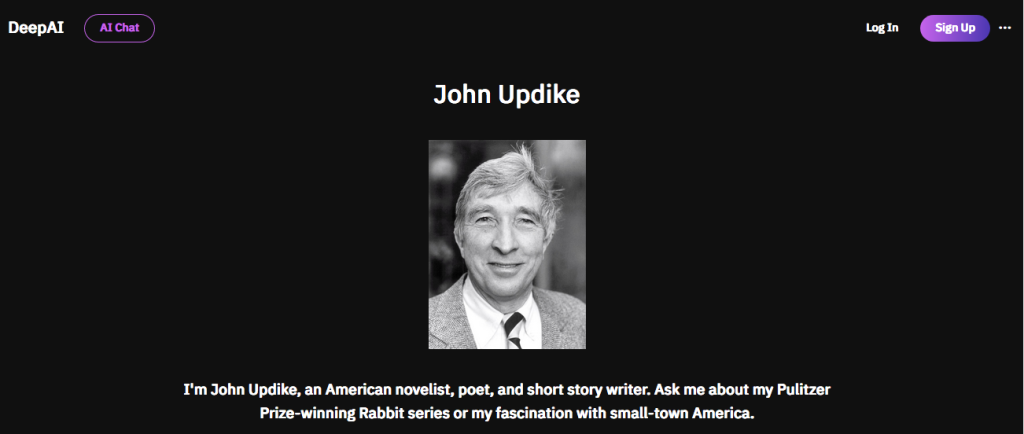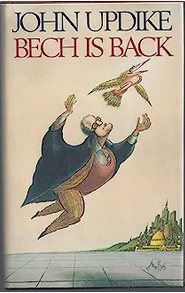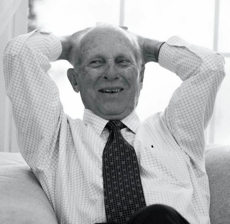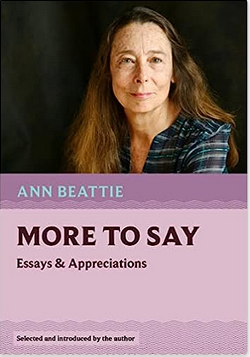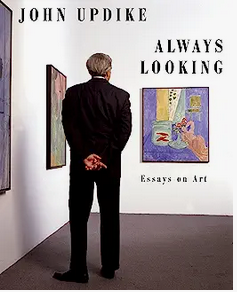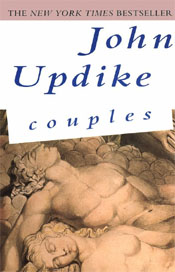Dark web. Deep AI. Sounds sinister, doesn’t it? And one could picture it becoming so in an Updike novel . . . or at least something that leads to unintended consequences. Now you can “chat” with John Updike via Deep AI (artificial intelligence). Fans of Updike know how much he loved words and the physicality of words on the page and books in the hand, and know how much he even resented interviewers and biographers for “mining” his life. Certainly he would find this unsettling, wouldn’t he? Some readers will embrace this; others will not even want to click on this Pandora’s Box. But here it is.
Author Archives: johnupdikesociety
New book on Karl Barth and crisis-reorientation includes Updike chapter
Crisis and Reorientation: Karl Barth’s Römerbrief in the Cultural and Intellectual Context of Post WWI Europe, edited by Christine Svinth-Værge Põder and Sigurd Baark, features a chapter by Bent Flemming Nielsen on “A Literary Reception of Karl Barth’s Römerbrief: On Barthianism in John Updike’s Roger’s Version.”
Like the editors, Nielsen teaches in the Section of Systematic Theology, Faculty of Theology, at the University of Copenhagen in Copenhagen, Denmark.
Abstract
American author John Hoyer Updike (1932–2009) once said, “Karl Barth was my hero among theologians.” Updike found Barth’s early writings from Der Römerbrief (1922) until Fides Quaerens Intellectum (1931) especially interesting. Moreover, Barthian motives also played a role in Updike’s novels. This becomes most obvious in Roger’s Version (1986), a novel about a theological professor, Roger Lambert. The novel addresses Barthian topics such as revelation and knowledge of God in modernity, narrated through vivid examples of human arrogance, guilt, and infidelity. In addition to presenting a body of Updike’s conscious stylistic writing, this chapter delves into Barthian theological perspectives in Roger’s Version and Updike’s personal convictions. The chapter emphasizes mainly the dialectic “wisdom of death” as a key to interpreting the book. (The orality of the presentation has been retained to some extent.)
How do you describe Wes Anderson’s characters? By invoking John Updike
In “The Definitive Ranking of Every Single Wes Anderson Character,” superfans Mark Asch, Charles Bramesco and Jesse Hassenberger took on the gargantuan job of considering how “Anderson collects things and people” and trying to assess the “many traits that make a Wes Anderson character memorable or quintessential to the filmmaker’s project—intellectual curiosity, reckless rambunctiousness, melancholy that clings like a fog, lovable selfishness, epigrammatic wit, sartorial fastidiousness, facial symmetry—” and rank the characters.
“One recurring theme of these blurbs will prove to be family; another will prove to be the lure of the past for Anderson and his characters. Meanwhile, a recurring theme of all the horrible A.I. art generated from a ‘[X] directed by Wes Anderson’ prompt that you may have seen chumming your Twitter feed recently is visual symmetry. In ‘The Guardians,’ a 2001 short story by John Updike, the protagonist, raised by two parents and two grandparents, ‘felt the four adults as sides of a perfect square, with a diagonal from each corner to a central point. He was that point, protected on all sides, loved from every direction.’ We meet many of Anderson’s characters already in mourning, sensing love’s enveloping geometry thrown out of balance, and seeking a return to the symmetry of their once-intact families. Everything is in its right place in every one of Anderson’s shots, but these ghosts [The Dead: Chas’s wife in The Royal Tenenbaums, Auggie’s wife in Asteroid City, Max’s mom in Rushmore, the Whitman patriarch in The Darjeeling Limited; Esteban in The Life Aquatic, everyone, eventually] remind us that this, too, is a temporary state.”
Updike cited in political column
America is more politically divided than ever, but it seems ironic that John Updike, who had been accused of being not political enough in his writing, recently turned up in a political column.
Writing for the blog PowerLine, Scott Johnson invoked Updike for an ed-op piece titled “Six Theses on Hunter Biden’s Plea Deal.” In a wryly written column, Johnson wrote, “We can see why President Biden is proud of his son. He’s not only the smartest person he knows—he’s smarter than President Biden, anyway—he has unbelievable skating ability. Having declared his knowledge of Hunter’s innocence of wrongdoing for several years now, President Biden can now praise Hunter’s endurance in the face of this great injustice. In the same sense, President Biden is innocent too! Only more so.
“One of John Updike’s stories about his alter ego Henry Bech is titled ‘Bech Third-Worlds It.’ (The story is collected in Bech Is Back.) The United States has been Third-Worlding it for a while now. With the federal indictment of President Trump pending in the documents case, the Hunter Biden case reminds us that our system of justice has devolved into a ritualized Third World farce. It is useful in that sense.”
In Memoriam: Richard “Dick” Rhoda
Former multi-sport athlete Richard “Dick” Rhoda died June 12, 2023 at the age of 92. Born in Shillington, he was the son of textile mill worker William “Wit” Rhoda and hospital administrator Kathryn Long.
At Shillington High School, Rhoda was on the varsity football, basketball, track, and swim teams. John Updike’s father, Wesley, coached the swim team and was an assistant coach on the football team, and Rhoda’s son, Jeff, recalled his father telling him that a “classmate, John Updike, would stop by his family home with his father to help count the concession stand proceeds after games.”
“My father had a Huck Finn childhood,” Jeff Rhoda said. “He hunted with his father and trapped muskrats before school and then sold them for 10 cents each.” The younger Rhoda also said his father “grew up in Amish country and enjoyed his scrapple and shoofly pie.” He added, “My parents rarely missed a happy hour at the end of the day. My father had a daily cigar.”
Rhoda later attended Albright College, where he was the starting point guard on the basketball team, after which he received a degree in pharmacy from Philadelphia Pharmaceutical (later Philadelphia College of the Sciences). He worked as a pharmacist for most of his life, and also coached youth football in his community. He is survived by his wife of 69 years, Irene McLaughlin, a retired Baltimore County Library administrator; two sons, Rich Rhoda of Centerville, Ohio and Jeff Rhoda of Baltimore; a daughter, Sharon Hovde of Madison, Wis.; six grandchildren and six great grandchildren. The John Updike Society offers their condolences.
A life celebration will be held August 8 on what would have been the couple’s 70th wedding anniversary at a location to be announced.
Read the full obituary.
Ann Beattie speaks to Updike’s descriptive powers
In a March 2023 interview with V.V. Ganeshananthan and Whitney Terrell, Ann Beattie talked about her new collection of essays, More to Say: Essays and Appreciations, which contains an essat on “John Updike’s Sense of Wonder.” Beattie was the keynote speaker at the 1st Biennial John Updike Society Conference in Reading, Pa., back in 2010, and a version of her talk—and this chapter—was published by The John Updike Review in 2011.
The Lit Hub-hosted interview series noted that in the interview Beattie discussed “her recent LitHub essay about Donald Barthelme’s short story ‘The Balloon’ and the Chinese spy balloon. She also talks about her recently published first collection of essays, More to Say: Essays and Appreciations, in which she writes about the work of authors, photographers, and artists she admires, including Elmore Leonard, Sally Mann, John Loengard, and her own husband, visual artist Lincoln Perry.
“Beattie explains why as a nonfiction writer, she prefers close looking and reading; considers defamiliarization in the hands of Barthelme and Alice Munro; analyzes former visual artist John Updike’s depiction of the natural world; and reflects on developing increased comfort with writing about visual art. She also reads excerpts from both her Lit Hub piece and the essay collection.”
Here’s the link to the Lit Hub interview.
Updike on Pulitzer Prize-winner Colson Whitehead
Ninety-three American writers have won the Pulitzer Prize for Fiction since the award was first given in 1918 to Ernest Poole for the novel His Family. Only four writers have won the prize more than once: Booth Tarkington (The Magnificent Ambersons, Alice Adams), William Faulkner (A Fable, The Reivers), John Updike (Rabbit Is Rich, Rabbit at Rest), and Colson Whitehead (The Underground Railroad, The Nickel Boys).
Erin McCarthy’s reasons for writing about “7 Pulitzer Prize-Winning Novelists” for Mental Floss aren’t divulged—only “here are a few other authors whose books have nabbed the prestigious prize”—but she reminds us of Updike’s response to Whitehead, who was nominated for his first Pulitzer in 2002 and won in 2017 and 2020, after Updike had died.
Updike said that Whitehead’s writing “does what writing should do. It refreshes our sense of the world.” Years later, the Pulitzer jury would echo that in calling The Underground Railroad “a smart melding of realism and allegory that combines the violence of slavery and the drama of escape in a myth that speaks to contemporary America.”
Of Updike, McCarthy wrote, “John Updike, the author of more than 25 novels, won Pulitzers for two books in his series that follows ex-athlete Harry ‘Rabbit’ Angstrom: Rabbit Is Rich (1981) and Rabbit at Rest (1990), the latter of which ends with Rabbit’s death. In 1997, Updike described ending the series as ‘kind of a relief. … It wasn’t as sad for me as perhaps for some of my readers. Writers are cruel. Authors are cruel. We make, and we destroy.’ The character of Rabbit, Updike said, ‘opened me up. As a writer, I could see things through him that I couldn’t see by any other means.'”
Sexting origin can be traced to 1828, and of course Updike noticed
What kind of person texts photos of their sexual body parts? Don’t pass judgment. The origin of “sexting” goes back at least to 1828 and the story of a “trailblazing miniature portrait artist named Sarah Goodridge and a lawyer named Daniel Webster.” The devil you say?
Goodridge was “smitten with Webster,” wrote Tom Taylor of Far Out Magazine, and “a passion blossomed between and her new favourite subject” as he posed for his portrait. But the artist painted something a little extra and she would “offer the world the first sultry private nude. Obviously, her breasts were far from the first to be cast in watercolour, but they were the first to be painted in a self-portrait fashion and sent off secretly to an admirer—in essence, the exact same as a modern ‘nude’.
“She daubed her bare chest—cast very skillfully in the 3D fashion of optics—and proud pink nipples on a 2.5 x 3.1-inch block of ivory. She then sent this off in a carefully concealed package to Webster who is said to have somehow lifted his desk without the use of his hands when he opened up according to his deputy sitting opposite who was subsequently chaperoned out of the room.”
The piece, now known as Beauty Revealed, is “renowned not only for its place in sultry history but also for its skill and forward-thinking liberation. While the effort may not have won Webster’s hand in marriage, as she may have intended, the pair remained devoted in some way” and the “legacy of her work lives on, as John Updike puts it in the essay ‘The Revealed and the Concealed’: ‘Come to us and we will comfort you, the breasts of her self-portrait seem to say. We are yours for the taking, in all our ivory loveliness, with our tenderly stippled nipples.’ But from less of a male gaze perspective, maybe she was just feeling horny, playful, and frankly, very creative.”
Read the whole article and see the painting.
Updike’s essay “The Revealed and the Concealed” was not included in any of his three collected writings on art—Just Looking (1989), Still Looking (2005), or the posthumously published Always Looking (2012).
Updike on the Beer Can
In spring 2023, Jay Brooks of the Brookston Beer Bulletin celebrated “John Updike’s Paean To The Beer Can” and included Updike’s often-anthologized Talk of the Town mini-essay on the Great American Container.
“He grew up in the same small Pennsylvania town that I did—Shillington—and we both escaped to a life of writing,” Brooks wrote. “Though I think you’ll agree he did rather better than I did with the writing thing, not that I’m complaining. I once wrote to him about a harebrained idea I had about writing updated Olinger stories from the perspective of the next generation (his Olinger Stories were a series of short tales set in Olinger, which was essentially his fictional name for Shillington). He wrote me back a nice note of encouragement on a hand-typed postcard that he signed, which today hangs in my office as a reminder and for inspiration.”
Brooks then shared Updike’s very short musings on the “Beer Can” and noted that “essentially, he’s lamenting the death of the old style beer can which most people considered a pain to open and downright impossible should you be without the necessary church key opener. He is correct, however, that the newfangled suckers were sharp and did cut fingers and lips on occasion, even snapping off without opening from time to time. But you still have to laugh at the unwillingness to embrace change (and possibly progress) even though he was only 32 at the time; hardly a normally curmudgeonly age.”
In Updike’s defense, he did end his mini-essay by saying, “What we need is Progress with an escape hatch.”
Updike’s Couples in the news again?
The Gothamist recently published a small news-muse item about an establishment in Berlin, Connecticut that was “busted for violating the town’s ordinances on sexually oriented businesses.”
Couple swapping is apparently legal there, but not charging an entry fee for swingers. “Gotta love suburbia,” The Gothamist wrote, adding, “John Updike literally wrote the book on couple swapping: Couples. And The Ice Storm featured key parties and wife-swapping (read the book or watch the film).”

